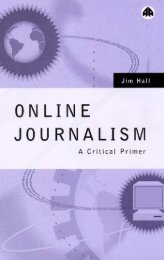Modul Mata Kuliah Journalisme Online - Ayo Menulis FISIP UAJY
Modul Mata Kuliah Journalisme Online - Ayo Menulis FISIP UAJY
Modul Mata Kuliah Journalisme Online - Ayo Menulis FISIP UAJY
Create successful ePaper yourself
Turn your PDF publications into a flip-book with our unique Google optimized e-Paper software.
Andrew Keen’s Fear Of Citizen Journalism<br />
In today’s Washington Post is an article audaciously titled Storming the News Gatekeepers. The author<br />
apparently meant to explore the nature of “citizen journalism” and its impact on conventional media<br />
and society. The end result however is far less significant than its ambitions as it focuses on a single<br />
Brooklyn blogger and fails to embrace the broader new media influence on the blogiverse.<br />
At one point though, the article takes a noticeable dip in IQ by quoting Andrew Keen, author of The Cult<br />
of the Amateur: How Today’s Internet is Killing Our Culture:<br />
“The term ‘citizen journalist’ has an Orwellian ring to it. People are becoming Big Brother, either with a<br />
camcorder or a keyboard, and following the candidates around. It’s ridiculous. You can’t just be a great<br />
journalist, the same way you can’t be a great chef or a great soccer player.”<br />
Journalists, he continues, “follow a set of standards, a code of ethics. Objectivity rules. That’s not the<br />
case with citizen journalists. Anything goes in that world.”<br />
For Keen to associate citizen journalism with Orwell is…well…Orwellian. Big Brother, as illustrated in<br />
“1984″ is the personification of an all-powerful and controlling government. The notion that the people,<br />
acting on their own behalf, could be characterized as such tyrannical overlords is preposterous to the<br />
point of idiocy.<br />
Likewise, Keen’s dismissal of citizen journalists as distinct from the conventional variety, who are<br />
supposedly objective and have standards and ethics, is as insulting as it is naive. Sure, there are bloggers<br />
who fly fast and loose with facts, but the same is true for pundits on TV and in newspapers. The best of<br />
the online reporters actually have greater transparency and include live links to sources and<br />
documentation.<br />
Keen obviously prefers media that is certified by corporate boards and is fearful of media that emanates<br />
from the streets. He would likely have denounced James Madison’s pamphlets as irresponsible and<br />
amateurish. On page 68 of his book he exposes his disgust for real people who have the temerity to<br />
engage in democratic discourse:<br />
“The YouTubification of politics is a threat to civic culture. It infantilizes the political process, silencing<br />
public discourse and leaving the future of government up to thirty-second video clips shot by<br />
camcorder-wielding amateurs with political agendas.”<br />
Contrary to silencing public discourse, YouTube and other web communities have expanded political<br />
dialog by including voices that previously were shut out of public debate. And the irony of Keen’s<br />
criticism of thirty-second video clips, without reference to the grandfathers of the genre - campaign ads<br />
- is the height of intellectual dishonesty.<br />
Keen would like to leave the future of government up to news bites produced by the professional<br />
propagandists in Corporate Media ivory towers. Apparently the political agendas of the old-school<br />
media hacks are superior, in Keen’s mind, to those of average Americans. With any luck the future of<br />
government will continue to benefit from greater participation and diversity, and will keep as far away<br />
from Keen’s nightmarish abomination of democracy as possible.
















